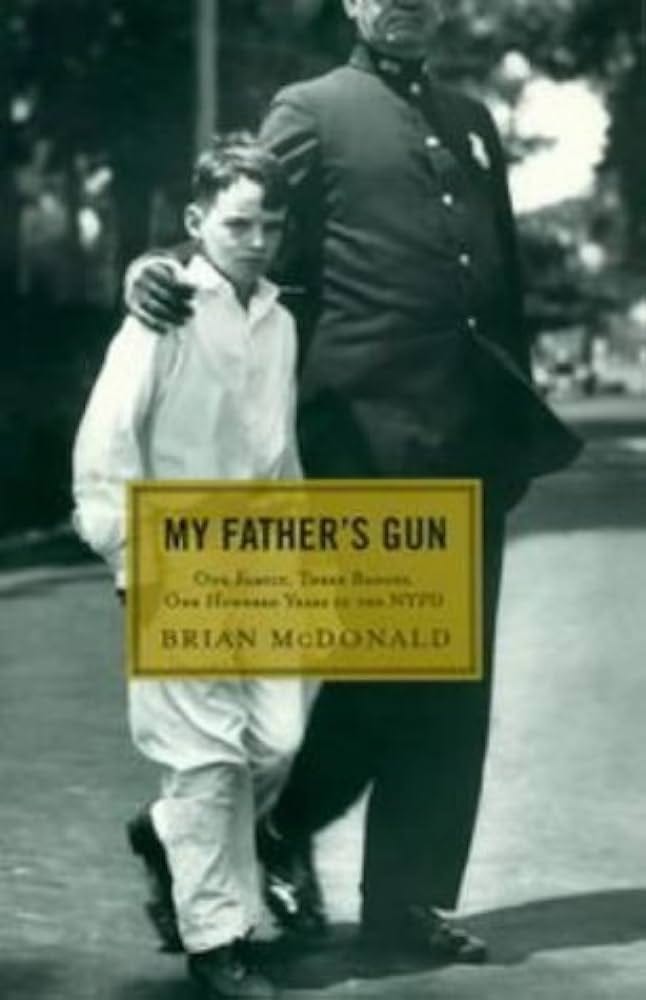My Father’s Gun by Brian McDonald (1999)
A rainy weekend is a good time to hit the books, so let’s take a look at this quick read by author Brian McDonald. My Father’s Gun is the tale of 3 generations of NYPD cops in the McDonald Family.
The narrative spans almost a century and covers everything from family relationships to thrilling police war stories. Seemingly mundane evenings at home in a cop household to significant historical events in New York City.
The author’s grandfather, Tom Skelly came OTJ (on the job) in 1893. A different time in many ways but some things remain the same. Skelly’s early days in the NYPD coincided with the Lexow Committee, the corruption probe that found systemic problems within the department. Skelly took the lessons of the probe to heart and was, by all accounts, beyond reproach. He was so morally upright that he ran afoul of the Tammany Hall machine and spent his later years on a traffic post in Manhattan.
His career was interspersed with significant figures and events. His first precinct commander was the notorious William Devaney, a corrupt wheeler and dealer who later became chief of department. Skelly was working during the General Slocum ferry disaster. He and his partner commandeered a boat to rescue people from the East River. His partner drowned after repeatedly diving in to rescue floundering survivors.
Brian McDonald’s father was the stoic Lieutenant Frank McDonald. Getting into the Detective Division as a young cop, he became a successful squad commander. Then Sergeant McDonald was sent to command the 41 Squad in Hunts Point in the 1950’s to “clean up the place”. He stayed a remarkable 14 years. He saw the city changing and Hunts Point was the face of the change, as crime began to skyrocket. He ran across characters like Detective Eddie Egan (The French Connection) and celebrities such as Jackie Gleason and Bing Crosby. Detectives were princes of the city in those days.
McDonald’s brother Frankie was the unlikely sibling to follow in his father’s footsteps. He started in the police department in 1966. A hard charger, Frankie started in the new Anti-Crime Unit in the 34th Precinct. He was present at the murders of Patrolmen Piagentini and Jones by members of the BLA. He also saw the corruption uncovered by the Knapp Commission that altered the NYPD for the better. His hard work earned him a spot in the newly created Street Crime Unit.
Like many cops, department charges due to an off-duty police action temporarily sidelined his career. A pit stop in the 50 Precinct had him “on the shelf” for a while. Frankie McDonald was able to bounce back and earn himself a spot in the Detective Bureau. He spent the remainder of his career working big cases including the murder of an off-duty cop, Detective McDonald was a dedicated cop right up until his last tour.
This story is about people, places, and The Job. The relationships between cops and their wives, cops and their families can be difficult. It is on display here in this heartfelt narrative. Places like the Fordham neighborhood of the Bronx to Pearl River, New York (as close as you will get to cop-land) play an outsized role in the family narrative. But most of all it is about the police department.
My Father’s Gun is about 300 pages, but it is a quick read. You can knock it out in a weekend with ease. It is available on Amazon for $12, but check your library first, especially if you are in the New York area. A tribute to a family’s dedicated service that you will enjoy.
Thanks for reading The Ops Desk. Stay Safe!






When I was a young Federal Special Agent assigned in Customs Internal Affairs after a stint in DEA working undercover, I had the honor of attending a corruption seminar where Tony Bouza was the main speaker. Tony was a significant part of the Knapp Investigation. His insight into corruption was amazing, including reflections on the suicides that sometimes follow the exposure of corruption. Tony passed away last year but left an impression on me that remained during my entire 30 year career. RIP Tony.
I met him once at Elaine's, as I recall. His rep was supposed to be of a very gruff, no-nonsense guy. But I recall him being very nice to me. He heard there were some other "police-types" there and he walked me over to introduce me. One was John Miller, who I ended up working for at the PD 20 years later. We drank a good while -- Beck's Dark. Miller bought them all. So 20 years later, I had a story to tell him.